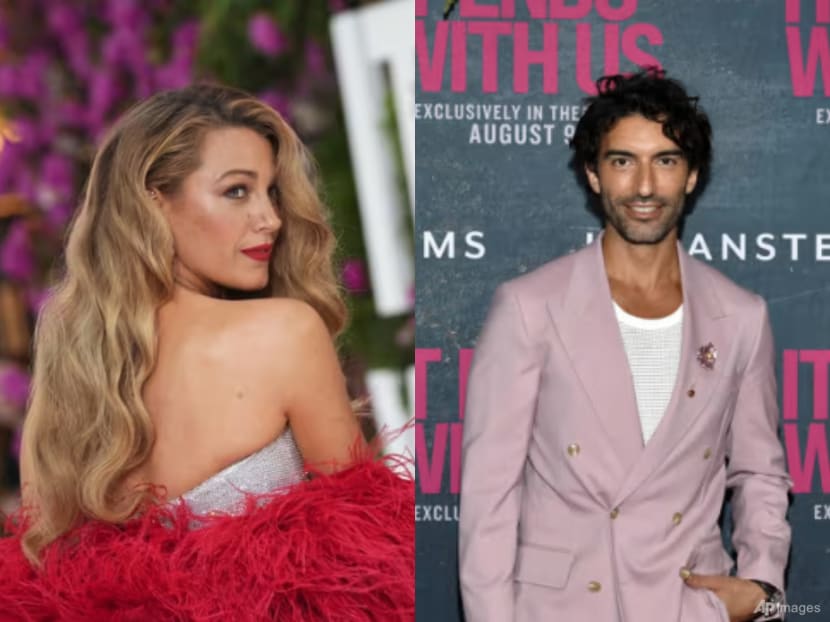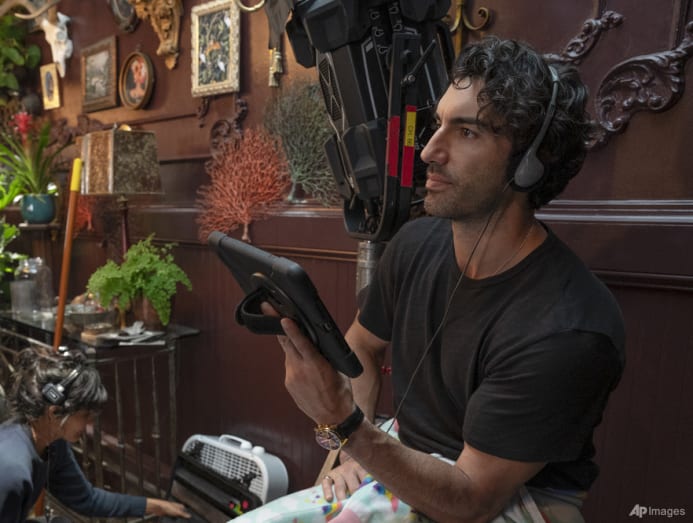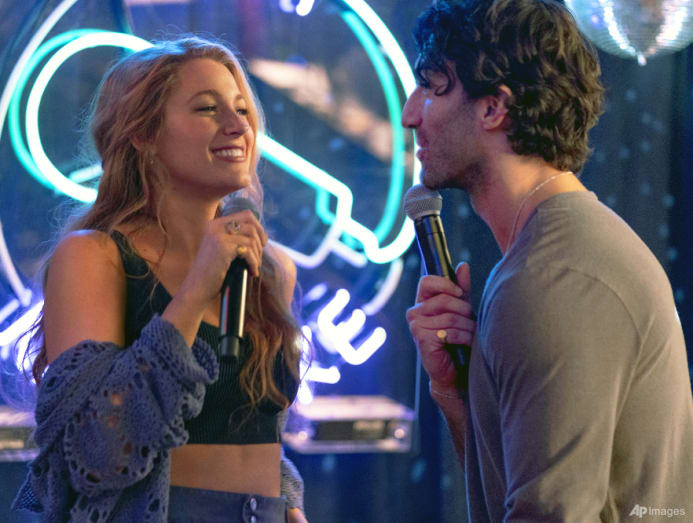Advertisement
Entertainment
One could argue Hollywood actress Blake Lively’s legal complaint about It Ends With Us co-star Justin Baldoni’s alleged sexual harassment and smear campaign simply reveals his unsavoury treatment of women. But here’s why this instance is not just another celebrity controversy.

Blake Lively at It Ends With Us screening in London on Aug 8, 2024; Justin Baldoni at It Ends With Us world premiere in New York on Aug 6, 2024. (Photos: Scott A Garfitt/Invision/AP, Evan Agostini/Invision/AP)
New: You can now listen to articles. 
This audio is generated by an AI tool.

27 Dec 2024 01:47PM (Updated: 27 Dec 2024 01:48PM)
Contrary to the popular idea that celebrity culture is mere fluff, I see it as a mirror. The celebrities, social media influencers, politicians and other public figures a person holds in high regard can reveal their own beliefs and aspirations.
So it’s easy to shun public figures whose values clearly appear misaligned with ours, from serial philanderers to untalented nepotism babies.
What’s hard is picking out a wolf in sheep’s clothing, and then to reconcile real life with reel life when the mask slips – especially when their public identity has been centred on being the exact opposite person.
I’m referring to American actor and director Justin Baldoni, whose reputation as a male feminist has gained him a strong following among progressive circles. His podcast Man Enough, for which he is well known, explores what it means to be a man today.
Such socially-conscious content is often seen as the antidote to the toxic masculinity associated with controversial internet personalities, like ex-kickboxer Andrew Tate, known for his hyper-masculine and misogynistic views, and podcast host Joe Rogan.
So it’s little surprise that Baldoni is frequently lauded for his refreshing stance.
But a recent New York Times (NYT) investigative report has revealed his alleged behaviour while filming It Ends With Us to be the opposite of what he preaches.
The report cited co-star Blake Lively’s 70-page legal complaint, which outlined the “repeated sexual harassment and other disturbing behaviour” she experienced on set from Baldoni and a producer. It also accused Baldoni of a smear campaign targeting Lively shortly after the movie was released in August, and included subpoenaed text messages between Baldoni and a crisis management team he had hired to damage her reputation. CNA Lifestyle has read the complaint.
This “multi-tiered plan”, which included planting theories and news stories critical of Lively, was allegedly orchestrated so she wouldn’t speak up about the “inappropriate conduct” on set.
“Mr Baldoni was desperate to suppress any suggestion that he engaged inappropriate conduct, much less sexually harassing conduct, because it would entirely undermine his carefully curated public image as a feminist ally,” the complaint read.
WHEN A GOOD GUY IS NOT THAT GOOD
Baldoni is not quite an A-Lister nor does he command mainstream recognition. One could argue he’s simply the latest male celebrity to have his unsavoury treatment of women make headlines.
But his case is far from another run-of-the-mill Hollywood Me Too moment.
The allegations about Baldoni’s harassment, along with his deliberate attempts to take down a woman who knew about them, are particularly jarring because his entire career has been built on being “one of the good guys”.

To be clear, such a public persona is gender neutral. Recall former talk show host and comedian Ellen DeGeneres, another “good” celebrity revealed to be the opposite. Allegations about her mistreatment of employees and toxic work environment, contrary to her talk show’s “be kind” mantra, eventually led to her controversial exit from TV.
In both cases, their personal branding driving “impactful change” was an intentional strategy, not a fandom’s wishful projections.
Unlike DeGeneres’ fervent advocacy to be kind that had a tendency to feel a little contrived, Baldoni didn’t intend to be seen as perfect. He often acknowledged how societal norms around masculinity have shaped his imperfect behaviours but that he was constantly learning to do better.
In other words, he would encourage women in Lively’s position to tell their truth, to hold men like him accountable for their actions – not attempt to silence her.
More relevantly, this construction of an ideal public persona happens too in everyday life, especially on social media. Someone doesn’t need to be an idolised public figure to have a desire to be seen in a specific way – or to succeed at it.
THE DANGER OF VULNERABILITY-DRIVEN CONTENT
Aside from Baldoni’s alleged transgressions, what troubled me most was the collective willingness to blur the lines between his public and private self – more so than in typical parasocial relationships.
The blurring of lines is often the halo effect at work: We assume someone good in one area must be good in all areas. For instance, if an actor is talented, we may assume they are also likeable. We are then disappointed when they cheat on their partner or display problematic political views, even as we recognise the average celebrity never reveals all of themselves online. Elusiveness is part of the allure of celebrity worship.

But Baldoni isn’t the average celebrity. He is part of the broader trend of a rise in “authentic” content (and content creators), which parallels the increase in therapy-speak among younger generations and their desire for deeper connections.
In his case, his content wasn’t just about redefining masculinity, but embracing vulnerability. He called out his shortcomings ingrained from decades of social conditioning. And ironically, being forthcoming about his humanity is a quality often considered rare in men that people forgot he was ultimately only human.
In my view, this tendency to put such content and their creators on a pedestal highlights a bigger issue about media literacy with what I call vulnerability porn. Even if you’re unfamiliar with Baldoni, you’d have come across similar content.
It tends to aim to “foster open and inclusive conversations” around social issues like mental health and gender equality, creating a “safe space” for fans to explore their own emotions and thoughts. Relatability, usually shown through vulnerability, is a hallmark of such “purpose-driven” storytelling.
When a ‘good person’ turns out to be the opposite, it’s not just their image that betrays us – but our flawed perceptions of what makes someone ‘good’.
The problem is, people who appreciate this brand of content tend to conflate vulnerability with authenticity.
Vulnerability is an interpersonal skill, and involves exposing hidden aspects of oneself to invite others into an intimate connection. Authenticity is focused on the individual, ensuring consistency in who you are, what you say and how you present yourself online.
From my observations, too much vulnerability-driven content lacks authenticity, making it feel like a calculated display of openness designed to elicit validation, admiration or emotional engagement.
While the existing positive impact of Baldoni’s work doesn’t disappear with this legal battle, perhaps this case should now make us realise the need to approach similar content with the same discernment as we would content that is explicitly misaligned with a progressive-leaning worldview.
Like all celebrity controversies, Lively versus Baldoni is ultimately less about the parties involved, but what the public reactions reveal about ourselves.
In this case, when a “good person” turns out to be the opposite, it’s not just their image that betrays us. It’s also our flawed perceptions of what makes someone “good” – which I believe the rise in Baldoni’s brand of content has led us to define as a display of self-awareness that one can do better.
So perhaps the truly socially-conscious takeaway is this: Just because someone appears open doesn’t mean they’re real.
